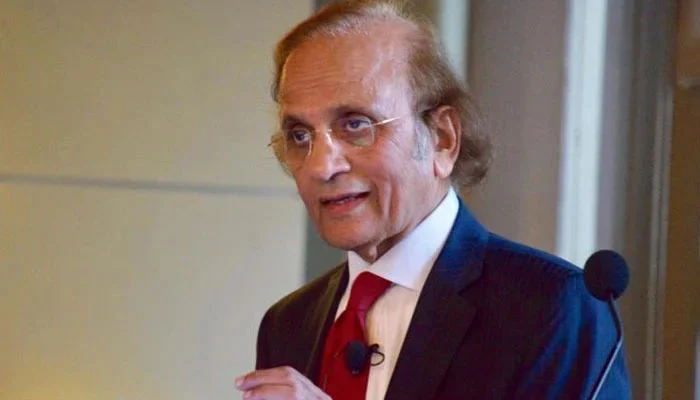ISLAMABAD: The federal cabinet has reportedly given its approval to establish an inquiry commission concerning allegations against Islamabad High Court judges. They have appointed the former Chief Justice of Pakistan, Justice (retired) Tassaduq Hussain Jillani, to lead this commission.
According to the reports, a single-member commission will be established to investigate the claims made by the judges in a letter. The judges from the Islamabad High Court (IHC), which include Justice Mohsin Akhtar Kiyani, Justice Tariq Mehmood Jahangiri, Justice Babar Sattar, Justice Sardar Ejaz Ishaq Khan, Justice Arbab Muhammad Tahir, and Justice Saman Fafat Imtiaz, sent this letter on March 26 to the Supreme Judicial Council (SJC).
In the letter, they requested the council to organize a judicial convention due to the alleged involvement of intelligence agencies in judicial matters.
In response to the letter, Pakistan’s Chief Justice Qazi Faez Isa asserted on March 28 that any interference by the executive branch in the judicial duties of judges would not be tolerated, regardless of the circumstances. This statement was made during a gathering with Prime Minister Shehbaz Sharif at the Supreme Court in Islamabad. During their discussion, both the Chief Justice and the Prime Minister agreed to establish an inquiry commission.
Following the Supreme Court’s decision that deemed the dismissal of former IHC Justice Shaukat Aziz Siddiqui as unlawful and requiring him to be treated as a retired judge, a significant letter prompted an urgent response. Consequently, the Chief Justice convened a gathering with the Islamabad High Court’s judges and the Chief Justice on the same day at 8 pm after Iftar, as stated by the top court on March 28th.
In a meeting that extended for over two and a half hours, the concerns of all the judges were addressed individually. On March 27, the Chief Justice of Pakistan convened with Attorney General Mansoor Usman Awan and Law Minister Azam Nazeer Tarar.
Following this, the CJP, accompanied by Senior Puisne Judge Mansoor Ali Shah, held discussions with the President of the Supreme Court Bar Association and the most senior member of the Pakistan Bar Council present in Islamabad, as reported by the SC.
A gathering of all Supreme Court judges, led by the Chief Justice, took place at 4 pm on the same day. They discussed the concerns raised in a letter from six Islamabad High Court judges. Most Full Court members agreed that due to the seriousness of the matter, the CJP should meet with Pakistan’s Prime Minister to address these issues. The meeting was then adjourned.
Following this, Prime Minister Shehbaz Sharif, accompanied by the law minister and the AGP, held a meeting with the Chief Justice, senior judge, and the Supreme Court registrar at the highest court at 2 pm on March 28th. The discussion continued for approximately 90 minutes, during which the CJP emphasized that executive interference in judges’ affairs and judicial operations would not be tolerated, and under no circumstances should the judiciary’s independence be compromised.
During the meeting, a suggestion was presented to establish an inquiry commission under the Pakistan Commissions of Inquiry Act, 2017. This commission should be led by a highly respected retired judge to investigate the issue, as mentioned in the statement.
The statement also added that Prime Minister Shehbaz committed to convening a federal cabinet meeting to seek their consent for the formation of this commission. Moreover, the premier wholeheartedly supported the opinions shared by CJP Isa and Senior Puisne Judge Shah.
Former CJ Tassaduq Jillani
After dedicating over a decade to the Supreme Court, including a brief term as the Chief Justice, Jillani retired as the highest-ranking judge on July 10, 2014. Born on July 6, 1949, 74-year-old retired Justice Jillani, obtained his LLB from the University of Punjab and began his legal career at the Multan district courts in 1974.
Jillani transitioned into an apex court lawyer in 1983. He was sworn in as a judge of the Lahore High Court in August 1994, and after ten years, he was promoted to the Supreme Court in July 2004. He served as the top court judge until the state of emergency was imposed in November 2007. He then took the oath as a Supreme Court judge once again in 2008. In 2013, he was appointed as the Chief Justice of Pakistan.
In August 2023, the former Chief Justice of Pakistan was bestowed with the prestigious 2023 American Bar Association (ABA) International Human Rights Award. This recognition came in appreciation of his “courageous judgments” against political impunity during a crisis and his unwavering commitment to uphold judicial independence in Pakistan.
In addition to this accolade, he was also awarded the 2020 J Clifford Wallace Award by the J Reuben Clark Law Society (JRCLS), an esteemed organization. This honor celebrated his “extraordinary career” as a judge and jurist.
Justice Jillani’s reputation as a “balanced” judge preceded him, as he delivered influential rulings on both domestic and international matters of great significance.
Among his notable decisions are those addressing fundamental rights, gender equality, and education. He also supported dual nationality in the era of global interdependence and established guidelines for legal and medical education improvements. In the Lahore High Court and the supreme court, his impact was significant.
Two pivotal rulings that gained him prominence were allowing an adult Muslim woman to marry her chosen partner and his groundbreaking 2014 minority rights judgment. This ruling came after he took initiative on the protection of minorities following a tragic church blast in Peshawar that claimed 81 lives.










